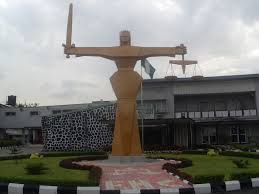 PRESIDENT Buhari recently charged the Nigerian judiciary to “go the extra mile to sanitise itself and improve its capacity to act independently, courageously and tirelessly” while stressing “the financial independence of the judiciary.” Nigeria’s judiciary remains susceptible to manipulation, mostly at the state level. The President should take the lead in guaranteeing judicial autonomy.
PRESIDENT Buhari recently charged the Nigerian judiciary to “go the extra mile to sanitise itself and improve its capacity to act independently, courageously and tirelessly” while stressing “the financial independence of the judiciary.” Nigeria’s judiciary remains susceptible to manipulation, mostly at the state level. The President should take the lead in guaranteeing judicial autonomy.
Judiciary Staff Union of Nigeria’s (JUSUN) protracted nationwide strikes speak to problems confronting Nigeria’s judiciary. JUSUN is pressing home its anxiety over the non-compliance by the Federal and State Governments to constitutional dictates on the judiciary’s financial autonomy. JUSUN’s strikes have lingered, because Government is inattentive, indifferent and intransigent. Government is also not evocatively engaged in a dialogue process; rather it seeks what mediators call “red space interaction” that is “mostly heated and adversarial.”
There’s no question that the judiciary has its challenges; some systemic and others, self-inflicted. But there’s also no question that the ongoing impasse emanates from the Executive Branch tempering with judicial autonomy via fiscal fiats and subterfuge. State Governors deploy such fiscal control to orchestrate judicial outcomes of a political nature. Such officious acts are fraught with illegalities. The judiciary is being underfunded; such insidious acts have negative implications for rule of law and due process. They also diminish the risk-averse viewpoint of judicial reviews and rulings and make courts partisan.
The desired to uphold judicial autonomy led to the suit filed by Olisa Agbakoba (SAN), against the Attorney-General of the Federation (AGF), the National Judicial Council (NJC) and the National Assembly in February 2013, challenging extant methods of appropriation of judiciary’s budget, as being contrary to the constitutional provisions of Section 81 (3) of the 1999 Constitution. Still, State Governments continue to breach Section 121 (3), which stipulates that “any amount standing to the credit of the judiciary in the Consolidated Revenue Fund of the State shall be paid directly to the head of the courts concerned.” In JUSUN v. FGN (2014), the Federal Government and the 36 state governors were restrained from appropriating funds meant for the judiciary.
Yet, only one-third of the 36 States have instituted full or partial judicial autonomy. In sum, failure to comply fully with provisions of sections 81(3), 121(3) and 162(9) of the 1999 Constitution, translates to Federal and State Governments’ intransigent and willful violation of the Constitution.
The role of the judiciary in any democracy is sacrosanct. The efficacy of the judiciary hinges on its independence; which includes, its doctrinal, operational and financial autonomy. The judiciary is the last resort for those seeking redress. These responsibilities make the judiciary a very powerful tool of governance; but only if its autonomy is unimpeded. Nigeria’s democracy is being consistently strengthened by the judiciary.
All said, the judiciary’s self-induced problems relate to schizophrenic tendencies within it. How else does one interpret inexplicable ex parte orders, indefinite adjournments and perpetual injunctions, all of which translate to diminution of the credibility of courts and the broadening perception that Nigerian courts are malleable? Despite all its shortcomings, the judiciary needs to be rescued from political brigandage. The personality cults that dominate our politics must not dominate our judiciary.
There’s something else. In democracies, the strength and character of an independent judiciary are strikingly similar. Just as Nigerian Supreme Court decided the Awolowo v. Shagari (1979) case, the U.S. Supreme Court also decided the Bush v. Gore (2000) case, which according to experts, “was perhaps the closest the U.S. Court came to choosing partisan side.” Clearly, these were not actions of timid courts. Both outcomes, which strengthened Nigerian and American democracies respectively, wouldn’t have been possible but for courts being resolutely independent and free of encumbrances from the Executive and Legislative branches. The Nigerian judiciary must be shielded from partisanship.
From a policy perspective, the extant budgetary modalities used for appropriating funds to the judiciary conflicts with the 1999 Constitution. The modalities undermine the intended insulation of judicial officers from partisan inducements. President Buhari’s Fiscal Year 2016 Draft Budget, his first, offers him a unique opportunity to unbundle judicial appropriations from those of the Executive Branch as envisaged in Section 81(3) of the Constitution. Rescuing the judiciary will require two Executive measures.
First, the President should issue an Executive Order directing the immediate implementation of the JUSUN-FGN Memorandum of Understanding of November 27, 2014. Second, the President should include specific narratives in the FY 2016 Draft Budget, for disbursing funds directly to the judiciary. The narratives should compel the Federation Account Allocation Committee (FAAC) to delineate funds due to the judiciary and disburse them accordingly; compelling states to do likewise. With these, the President will affirm his commitment to a stronger judiciary.
GUARDIAN
END

Be the first to comment